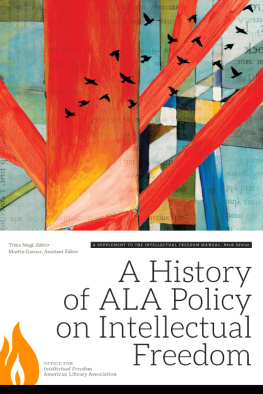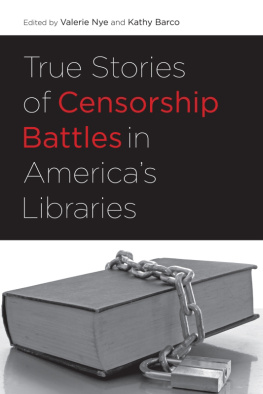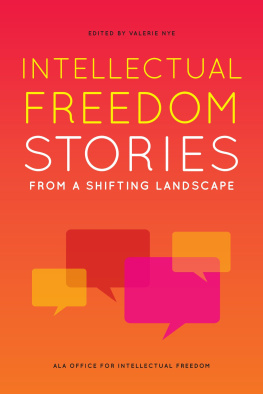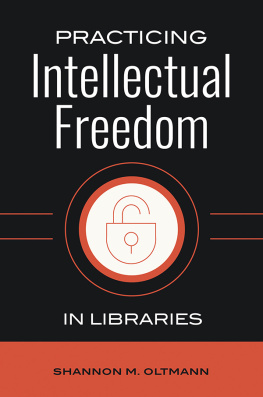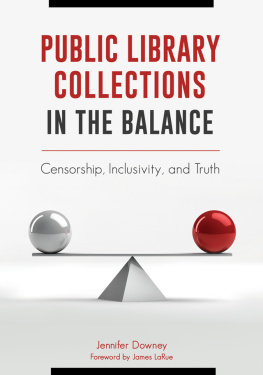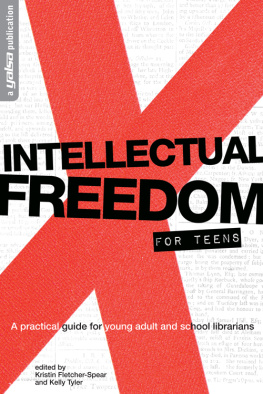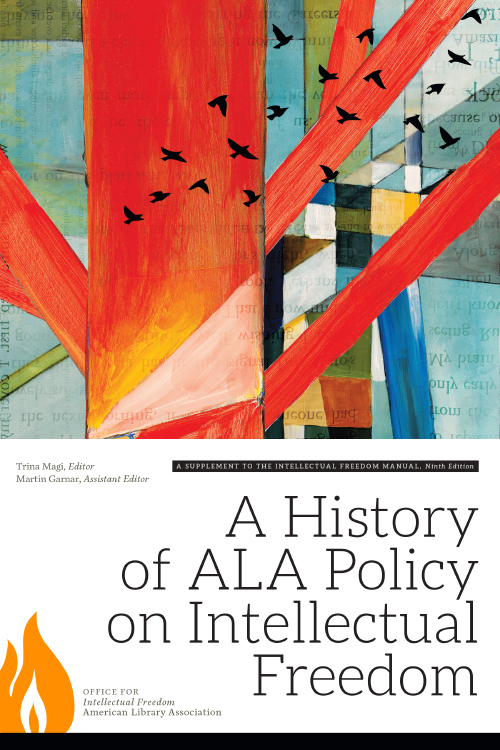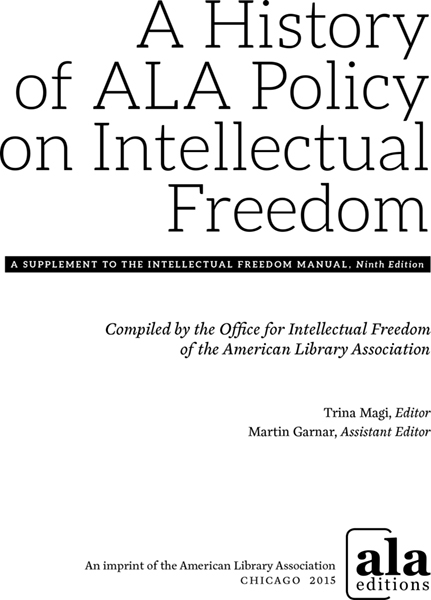Judith F. Krug and Candace D. Morgan; updated by Barbara M. Jones
T his book is a companion volume to the American Library Associations Intellectual Freedom Manual, ninth edition. The manual provides helpful resources and current official ALA documents on intellectual freedom, and this volume provides essays about the history and development of those official documents.
In the past, earlier versions of these essays were included in the Intellectual Freedom Manual itself. In the ninth edition, the inclusion of new documents and resources in the manual made it impractical to include the historical information in the main volume. The essays remain important, however. By tracing the creation and revision of official documents on intellectual freedom, the essays provide a record of intellectual freedom concerns that librarians have faced over the last century and the American Library Associations response to those concerns. Together, the Intellectual Freedom Manual, ninth edition, and this supplement provide a look at intellectual freedom that is both historical and current, and both theoretical and practical.
Scope
In addition to a broad overview of ALAs stance on intellectual freedom, this volume provides information about the history of all the current ALA documents that are contained in the Intellectual Freedom Manual, ninth edition, including:
Four core intellectual freedom documents of the American Library Association
Twenty-one interpretations of the ALA Library Bill of Rights
One interpretation of the Code of Ethics of the American Library Association
Three ALA resolutions and policies on intellectual freedom topics
Three sets of guidelines for writing library policy developed by the ALA Intellectual Freedom Committee
Guidelines for responding to challenges
Arrangement
presents a historical overview of the American Library Associations concerns and activities regarding intellectual freedom from 1924 to the present, updated by Barbara M. Jones, director of the ALA Office for Intellectual Freedom.
presents an essay on the history of each of the four core intellectual freedom documents of the American Library Association:
Library Bill of Rights
Code of Ethics of the American Library Association
The Freedom to Read
Libraries: An American Value
presents an essay about the history of each of these items. The essays are arranged in alphabetical order by title of the document.
: The subject index makes it easy to identify essays about the history of ALA documents related to a particular intellectual freedom issue such as access, censorship, or privacy.
Who Will Find This Book Helpful
Library administrators
Library workers and volunteers
Members of library governing bodies
Library and information science faculty members and students
Scholars of librarianship, intellectual and academic freedom, history, and civil liberties
Members of the American Library Association Executive Board, ALA Council, and ALA committees
Acknowledgment
We gratefully acknowledge the editors of previous editions of the Intellectual Freedom Manual for their careful recording of the history of these documents.
TRINA MAGI
Editor
Judith F. Krug and Candace D. Morgan
Updated from the Intellectual Freedom Manual, eighth edition, by Barbara M. Jones
A t the outset, two myths can be dispelled: namely, that intellectual freedom in libraries is a tradition and that intellectual freedom has always been a major, if not the major, part of the foundation of library service in the United States. Both myths, assumed by many librarians, are grounded in the belief that librarians support a static concept of intellectual freedom. Nothing, however, could be further from the truth.
The attitude of librarians toward intellectual freedom has undergone continual change since the late nineteenth century when, through the American Library Association (ALA), the profession first began to approach such issues with the semblance of a unified voice. The ALA, however, has never endorsed a uniform definition of intellectual freedom. Instead, through the ALA Council (the ALAs governing body), the Intellectual Freedom Committee (IFC), the Committee on Professional Ethics (COPE), and the Office for Intellectual Freedom (OIF), ALA has promoted a variety of principles aimed at fostering a favorable climate for intellectual freedom, but without the limits imposed by a rigid definition. This approach has permitted a broad definition capable of meeting librarians needs as they arise.
The seeds of the general definition of intellectual freedom were sown in the movement against censorship of published materials and grew into a strong, central trunk from which many branches of ALA and intellectual freedom have continued to spring. One branch concerns the library users access to all of the resources in a library collection. Another pertains to the librarians professional practice, particularly selecting and making available published resources to all library users and protecting the confidentiality of user records to ensure that every individual may use the library freely and without fear of reprisal. At stake also is the librarians personal intellectual freedom: participation in the democratic process, the right to free expression, and the right to pursue a chosen lifestyle without fear of negative professional repercussions. Yet another aspect of intellectual freedom encompasses the library as an institution and its role in social change and education. Of particular importance is the question of advocacy versus neutrality. Can a library committed to intellectual freedom and to providing materials that represent all points of view also support one point of view?

